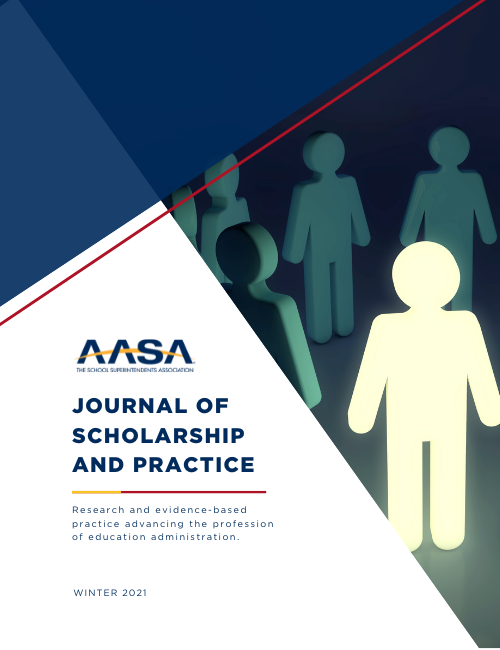2021 Winter Journal of Scholarship and Practice

In his editorial, Ken Mitchell writes, “We are in a transitional moment … as we move into 2021, after a year fraught with American loss of life and economic devastation for many, we await a vaccine to stop a raging pandemic. After a contentious presidential election in a divided nation, many hope for movement towards unity.”
Mitchell goes on to say that as microcosms of diverse communities, public schools are not immune to the social and political strife outside their doors. The conflicts infiltrate school systems from the school board meeting to the classroom, in contested spaces where educators contend with challenges to what is or is not taught: evolution, climate change, social justice, religion, and sexual development, he says. The controversy is often the difference between the science of learning or accepted facts and confirmation bias, a tension exacerbated in the current transitional moment.
In this contested moment of transition, superintendents strive to maintain academic integrity founded on truth to prepare students for life’s apolitical realities. To that end four research articles that have been assembled and dedicated to helping with this work by examining the topics of superintendent transition.
The following four questions, central to each of the studies in the issue, reflect themes of relationships and communication, elements connected to effective leadership in any moment of transition and strife.
- How well are Latina superintendents represented in our nation’s schools? Where are they most accepted and why? Irma Castillo, Velma Menchaca, Veronica Lopez-Estrada address this question in “Latina Female Superintendents Securing Positions in Small Rural School Districts.”
- The answer to the question how do outgoing and incoming superintendents collaborate during the transition to ensure organizational continuity is provided by writers Frank D. Davidson, Michael Schwanenberger and Howard Carlson. Their article is titled “Superintendents’ Perceptions of the Assistance Provided by Their Predecessors During a Change in Leadership.”
- What are the most important leadership traits that superintendents and school board presidents seek in each other? This question is addressed by Erik Person, Steven Chesnut, David De Jong, Derrick Robinson and Dianna Messick in the article “Leadership Traits of Superintendents in a Rural, Midwest State: Perceptions of School Board Presidents and Superintendents.”
- How does superintendent “talk” relate to the effectiveness of their leadership and the engagement of stakeholders is the fourth question? William Holmes reports on research regarding this question in “Self-reflections on the Amount of Superintendent Talk and Impact on Stakeholders from Wyoming Superintendents.”
Advertisement
Additional Articles
-
Latina Female Superintendents Securing Positions in Small Rural School Districts
This study revealed that Latina superintendents were attracted to small rural districts with a familial environment with high levels of parental and community involvement.
-
Superintendents’ Perceptions of the Assistance Provided by Their Predecessors During A Change in Leadership
The findings indicate that one third of successor superintendents have a strongly favorable view of the helpfulness of their predecessor.
-
Leadership Traits of Superintendents in a Rural, Midwest State: Perceptions of School Board Presidents and Superintendents
This study examined which leadership traits of superintendents were most important according to superintendents and school board presidents in a rural state in the Midwest.
-
Self-reflections on the Amount of Superintendent Talk and Impact on Stakeholders from Wyoming Superintendents
Superintendents talk over 74% of the time to accomplish the work of the superintendency
Advertisement
Advertisement



